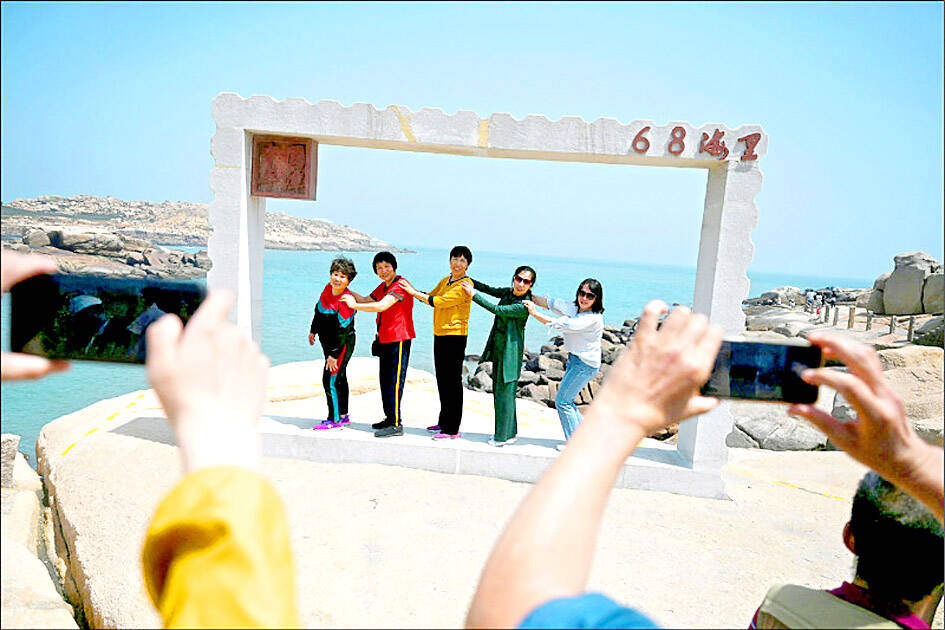Thirteen measures that China’s Fujian Province says would benefit Taiwanese appear to be part of an effort by Beijing to “localize” the Taiwan Strait by asserting that Taiwan is a province of China, an expert has said.
While a group of 17 Chinese Nationalist Party (KMT) lawmakers were visiting Beijing from Friday to Sunday last week, Fujian announced measures it said would benefit Taiwanese, including helping Taiwanese in China handle reimbursements of medical expenses under Taiwan’s National Health Insurance system.
Another of the measures was a “Fujian-Matsu City Pass” for residents of Lienchiang County (Matsu).

Photo: AFP
Tzeng Wei-feng (曾偉?), an assistant research fellow in National Chengchi University’s Institute of International Relations, said the moves reflected China’s efforts to localize the Taiwan Strait and claim that Taiwan is a province of China, only requiring coordination between provinces, not countries.
“I believe these measures will be somewhat appealing to residents of Kinmen County and Matsu ... but for residents on Taiwan proper, I think they will have less interest,” Tzeng said.
Beijing also announced measures it said would benefit Taiwan during the KMT delegation’s visit, including allowing tourists from Fujian once again to travel to Matsu, and resuming access to China’s market for some Taiwanese agricultural and fishery products.
Analysts have interpreted the measures as a move by Beijing to pressure president-elect William Lai (賴清德) ahead of his May 20 inauguration.
National Taiwan Normal University professor Huang Hsin-hao (黃信豪) said the measures could be seen as a signal to Lai, which might influence his inaugural speech to “not lean too much toward Taiwanese independence.”
China’s moves were also related to the situation in the Legislative Yuan where none of the two major parties hold an absolute majority, allowing Beijing some leeway to take a softer approach, said Huang, who specializes in Chinese Communist Party (CCP) politics.
Echoing Huang’s views was Chao Chun-shan (趙春山), an honorary professor with the Graduate Institute of China Studies at Tamkang University.
Chao said that Beijing has put pressure on Lai’s incoming administration by proposing measures and conveying messages with the aim of eliciting a response.
“Beijing hopes that Lai will provide a more positive and proactive response regarding cross-strait relations in his speech on May 20 ... and not mention phrases that could easily escalate hostilities between the two sides,” Chao said.
Beijing’s actions were also intended to demonstrate to the US its sincerity in improving relations across the Taiwan Strait, especially after US Secretary of State Antony Blinken’s visit to China from Wednesday to Friday last week, he said.
“The US hopes for dialogue between the two sides of the Taiwan Strait, and Beijing’s current message is that at least in terms of tourism and some other aspects, the two sides can have a discussion,” he added.
However, China also sent 12 military aircraft across the median line of the Taiwan Strait on Saturday last week, leaving many observers wondering why it would conduct military exercises while KMT lawmakers were in Beijing.
Tzeng said it was part of a two-pronged strategy of the CCP involving different chains of command in China’s Taiwan Affairs Office and the Chinese People’s Liberation Army.
If top CCP leaders, such as Chinese President Xi Jinping (習近平), perceive no substantial progress in cross-strait relations, they are unlikely to exert pressure on the Central Military Commission to cease military exercises around Taiwan, Tzeng said.

An undersea cable to Penghu County has been severed, the Ministry of Digital Affairs said today, with a Chinese-funded ship suspected of being responsible. It comes just a month after a Chinese ship was suspected of severing an undersea cable north of Keelung Harbor. The National Communications and Cyber Security Center received a report at 3:03am today from Chunghwa Telecom that the No. 3 cable from Taiwan to Penghu was severed 14.7km off the coast of Tainan, the Ministry of Digital Affairs said. The Coast Guard Administration (CGA) upon receiving a report from Chunghwa Telecom began to monitor the Togolese-flagged Hong Tai (宏泰)

A cat named Mikan (蜜柑) has brought in revenue of more than NT$10 million (US$305,390) for the Kaohsiung MRT last year. Mikan, born on April 4, 2020, was a stray cat before being adopted by personnel of Kaohsiung MRT’s Ciaotou Sugar Refinery Station. Mikan was named after a Japanese term for mandarin orange due to his color and because he looks like an orange when curled up. He was named “station master” of Ciaotou Sugar Refinery Station in September 2020, and has since become famous. With Kaohsiung MRT’s branding, along with the release of a set of cultural and creative products, station master Mikan

Actor Lee Wei (李威) was released on bail on Monday after being named as a suspect in the death of a woman whose body was found in the meeting place of a Buddhist group in Taipei’s Daan District (大安) last year, prosecutors said. Lee, 44, was released on NT$300,000 (US$9,148) bail, while his wife, surnamed Chien (簡), was released on NT$150,000 bail after both were summoned to give statements regarding the woman’s death. The home of Lee, who has retreated from the entertainment business in the past few years, was also searched by prosecutors and police earlier on Monday. Lee was questioned three

RISING TOURISM: A survey showed that tourist visits increased by 35 percent last year, while newly created attractions contributed almost half of the growth Changhua County’s Lukang Old Street (鹿港老街) and its surrounding historical area clinched first place among Taiwan’s most successful tourist attractions last year, while no location in eastern Taiwan achieved a spot in the top 20 list, the Tourism Administration said. The listing was created by the Tourism Administration’s Forward-looking Tourism Policy Research office. Last year, the Lukang Old Street and its surrounding area had 17.3 million visitors, more than the 16 million visitors for the Wenhua Road Night Market (文化路夜市) in Chiayi City and 14.5 million visitors at Tainan’s Anping (安平) historical area, it said. The Taipei 101 skyscraper and its environs —